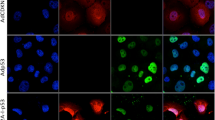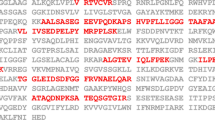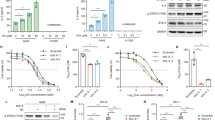Abstract
The p21WAF1/CIP1 gene, which encodes a cyclin-dependent kinase inhibitor, may be critical for tumor suppressor gene p53-induced cell cycle arrest. The p53 gene is known to regulate G1 checkpoint, which can either induce G1 arrest or initiate apoptosis. To directly examine the role of p21WAF1/CIP1 in the control of p53 function, we have introduced human p21WAF1/CIP1 gene into a p53-deficient human non-small cell lung cancer cell line H1299 using a p21WAF1/CIP1-expressing adenoviral vector (AdCMVp21). Infection with AdCMVp21 resulted in high levels of p21WAF1/CIP1 expression and significantly suppressed the growth of H1299 cells through the G1 arrest of the cell cycle. In contrast, transient expression of the wild-type p53 gene by a recombinant adenoviral vector (AdCMVp53) in H1299 cells induced apoptotic cell death and resulted in a rapid loss of cell viability. We then examined the effects of combined infection with AdCMVp21 and AdCMVp53 on H1299 cells to explore the dominant function of these molecules. Interestingly, introduction of exogenous p53 overcame p21WAF1/CIP1-mediated cell cycle arrest at G1 and induced apoptosis, although viral-transduced p21WAF1/CIP1 expression level was unaffected. These observations suggest that p53 expression converts a p21WAF1/CIP1-mediated growth arrest into apoptosis. The result was repeated with two additional human colon adenocarcinoma cell lines with the different p53 status, mutant p53-expressing DLD-1 and wild-type p53-expressing LoVo, suggesting that this phemonenon is a general event among human cancer cells. Thus, p53-mediated apoptotic pathway is dominant over the growth arrest pathway, indicating that p53 may be an essential upstream mediator of p21WAF1/CIP1 in the regulation of a cell process leading either to growth arrest or to apoptotic suicide.
This is a preview of subscription content, access via your institution
Access options
Subscribe to this journal
Receive 50 print issues and online access
$259.00 per year
only $5.18 per issue
Buy this article
- Purchase on Springer Link
- Instant access to full article PDF
Prices may be subject to local taxes which are calculated during checkout
Similar content being viewed by others
Author information
Authors and Affiliations
Rights and permissions
About this article
Cite this article
Kagawa, S., Fujiwara, T., Hizuta, A. et al. p53 expression overcomes p21WAF1/CIP1-mediated G1 arrest and induces apoptosis in human cancer cells. Oncogene 15, 1903–1909 (1997). https://doi.org/10.1038/sj.onc.1201362
Received:
Revised:
Accepted:
Issue Date:
DOI: https://doi.org/10.1038/sj.onc.1201362
Keywords
This article is cited by
-
An intrinsic purine metabolite AICAR blocks lung tumour growth by targeting oncoprotein mucin 1
British Journal of Cancer (2023)
-
Synergistic anti-proliferative and apoptotic effect of NVP-BEZ235 and curcumin on human SH-SY5Y neuroblastoma cells
Medical Oncology (2023)
-
Multipronged activity of combinatorial miR-143 and miR-506 inhibits Lung Cancer cell cycle progression and angiogenesis in vitro
Scientific Reports (2018)
-
Structurally novel steroidal spirooxindole by241 potently inhibits tumor growth mainly through ROS-mediated mechanisms
Scientific Reports (2016)
-
PI3 Kinase inhibition on TRAIL-induced apoptosis correlates with androgen-sensitivity and p21 expression in prostate cancer cells
Apoptosis (2011)



